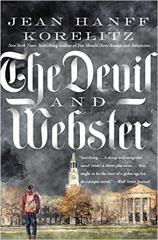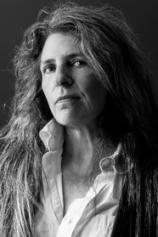Author Talk: April 4, 2017
Jean Hanff Korelitz is the bestselling author of such novels as YOU SHOULD HAVE KNOWN and ADMISSION, and is the creator of BOOKTHEWRITER, a New York City-based service that sends authors to book groups. Her highly anticipated new work of fiction, THE DEVIL AND WEBSTER, is about a college president who must reevaluate her values and identity, a tangled student protest, and some of the most controversial issues on today’s college campuses. In this interview, Korelitz discusses her inspirations and what she hopes readers will take away from the book, as well as how notions of voice, gender and truth play a role in her storytelling.
Question: What inspired you to write this novel?
Jean Hanff Korelitz: I was in the middle of a perfectly ordinary conversation in my own living room when a guest started to tell me a story about something that happened on a certain college campus about 20 years earlier. My antennae started to hum. This story, it had so many of the things I love to think about, let alone to write about: the uneasy transition of 1960s idealism over the more complacent decades that followed, the clash between ideas and ideologies on a college campus, and above all, the stunning ability some people have to tell lies, and the equally stunning ability other people have to believe lies. The novel started to form in my head even before the conversation ended, and in fact I actively resisted investigating the real events my guest alluded to; I didn’t want them to interfere with the characters and events already taking shape.
Q: What went into creating the fictional Webster College?
JHK: One of the great pleasures of writing fiction is the mad scientist opportunity to combine reality at will. Astute readers may note my appropriation of one American college’s origin story (or at least elements therein) and another American college’s current reputation, but in the universe THE DEVIL AND WEBSTER occupies, Webster is all Webster. In its two-and-a-half century history, it has meandered through the culture wars and responded to political, sociological and economic realities as they themselves have meandered; this is a phenomenon well known to anyone who studies the lives of institutions, or spends longer than their own four undergraduate years in close observation of a college or university, as I have done (Princeton University faculty spouse, 1990–present). Educational institutions are living, changing entities. They kind of fascinate me.
Q: This would have been a very different book if the protagonist had been a male college president. What decisions went into shaping Naomi’s character, a Jewish single mother, an outsider, and a feminist activist who finds herself as the face of the “establishment”?
JHK: I’m not sure how many of Naomi’s flaws are bound up in her gender, per se. She has a tendency to place her friendships unwisely (see Naomi Roth’s previous appearance in my 1999 novel, THE SABBATHDAY RIVER) and worries a bit too much about how she is perceived, but I think of these as human pitfalls, rather than specifically female ones. In a sense I never truly understood my own novel until I had the opportunity to draft jacket copy for the hardcover edition, a thorny little challenge that is often undertaken by editorial assistants. (As an editorial assistant at a major publisher in 1987, I performed this service for a number of novels and works of nonfiction. My efforts were of varying quality, but I’m grateful for the training, which has come in quite handy!)
It was while attempting to convey the plot and meaning of THE DEVIL AND WEBSTER in only a handful of sentences that I came up with the phrase who we think we are and what we think we believe. This is Naomi’s great task --- to reorient herself with respect to the principles that have guided her life, and recognize that it’s not just a question of the world having changed: she is also a different person than she once was.
Q: The book is narrated from the close third person perspective. Why did you choose to tell the story solely from Naomi’s point of view, rather than looking at the complicated dilemma at the center of the book from multiple perspectives? How much did the role of limited perception --- of self and others --- shape the story you wanted to tell?
JHK: I think it’s the case for many artists that we play to our own self-perceived strengths, or more accurately go to great lengths to avoid our self-perceived flaws. (Let us pause to recall that the genre-altering physical contortions of Bob Fosse’s choreography have their source in the fact that Fosse himself was slightly pigeon-toed…) I am not…how shall I put this? … gifted as a writer of voices. My protagonists do not speak to the reader: they think, and the reader hears them do it. There’s a big difference. Luckily, I am far more interested in the voices in our heads than the voices that come out of our mouths, so my way of writing is going to keep me engaged for as long as writing itself does.
Readers who want to hear the authentic voices of the American soul should hasten directly to Mark Twain, Joyce Carol Oates, Russell Banks, Alice Walker, Jane Hamilton and others, as I frequently do, myself, but please come back to me when you want to see what happens when a character who is smug in her own understanding of the world gets the rug pulled out from underneath her. Third person narration is my lane, in other words, and I am swimming in it.
Q: THE DEVIL AND WEBSTER is a fast-paced, twisty, exciting read, but, like the best books in the genre, carries a lot of deeper questions about truth, morality and righteousness. Arguably, the most important part of a college education involves grappling with these larger, unsolvable questions. What lessons do you want your readers to take away from this book?
JHK: To my mind, the great gift of a university setting is that --- ideally --- it’s an intellectually supportive place to encounter the ideas of people who completely disagree with you. If you think about it, that’s a door that often closes as we move forward into a work environment. To go to college and spend time only with others of your background and ideology is to waste an extraordinary opportunity. No wonder I have always enjoyed stories with a university setting! I am fascinated by human behavior, especially bad human behavior, and though there is absolutely no hope of ever solving the problem of evil, that doesn’t mean we don’t benefit from hearing the stories again and again. I’m not all that big on lessons when it comes to fiction, but on a personal level I’m pretty sure Naomi and I try to live by the same pair of principles: Do what you can. Don’t make it worse. Not all that complicated, and it works for me!
Q: What are you working on next?
JHK: Theater projects. Last fall my sister and I produced an immersive adaptation of James Joyce’s “The Dead” for the Irish Repertory Theatre in New York City. (My husband, Paul Muldoon, and I adapted the script from Joyce’s novella.) It was so much fun that our little production company, Dot Dot Productions LLC, now has a few other projects in development, including a revival of THE DEAD, 1904 this coming fall. As for the next novel, I’m one of those authors who needs to walk around without a clue for a year or two, and that’s fine --- so long as I’m alert and prepared when the next person tells me an amazing story and I suddenly think: I’m going to write a novel about that…








